![]()
The Words of the Park Family
|
|
The Words of the Park Family |
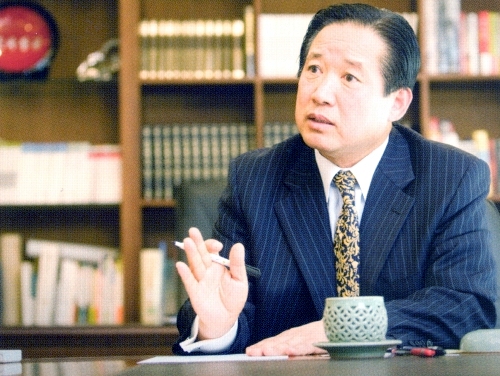
Mr.
Sang-gwon Park revealed his deep desire to help North and South
reunite as one country.
Mr. Sang Gwon Park is best known for being the president of Pyeonghwa Motors, a joint-venture company operating in North Korea. He divides his time between offices in Seoul and in Nampo, North Korea. In late November -- some weeks before he accompanied
Hyung-jin nim on two visits to the North -- we interviewed him about how lie established and runs the profit-making venture in North Korea and about his views on the reunification of the Koreas.
Question: How did you set up a joint-venture company in North Korea?
There are some ways in which Pyeonghwa [Peace] Motors is different from other companies. We have people from other countries -- Japan, Vietnam, China -- and I am actually an American citizen. That is how we operate. Many other [joint-venture] companies from other countries have disappeared, but we have remained and survived.
In the beginning we could sell only very few automobiles; we were selling 300 or 400 vehicles per year, but from three years ago we began making a profit. We'll make a profit this year too. Up to now we have already sold 1,700 or 1,800 vehicles.
We'll have more than a million dollars profit this year, I believe. We're the first company to make a profit through selling cars. We're working separate from any political issues and we're giving hope to the people of North Korea. We want all our cars to fill the streets of North Korea and we want to contribute to South Korea.
Now we want to have only our cars made and sold in North Korea. There are many things we need to do in the future but we have done quite a lot already. We have given the North Koreans pride, and hope for the people of South Korea to look at our business and say "Oh we must go there, too." I am saying that if many companies, if one thousand or two thousand companies from South Korea would have a business in North Korea, the path would widen with all that going back and forth. This is the path to unification. We can be united again. That is what I tell people.
Pyeonghwa Motors does not just belong to us. People in Korea and all over the world are watching our company to see how we do. We are the only survivor, so that's why we need to do well. So we hope that all the cars used in Pyongyang and all of North Korea will one day be our cars from Pyeonghwa Motors. We work with this idea in mind.
If we sell two thousand cars a year other people may say "Well, that's too few." But that is like selling two hundred thousand in South Korea, Japan, or America. It is difficult to do other businesses, but the automobile business is especially difficult. Yet we have succeeded in developing such a business. The fact that we could go there and be successful, and be recognized by the people of North Korea, means that we have a unique spirit of true love and unity.
True Father's meeting with President Kim Il Sung had a huge effect and good influence for us. That's one reason North Korea is supporting this. Having a car factory is not just for business but we are leading the way for the reunification of North Korea and South Korea and for world peace. We are reviving hope in the North Koreans and in all people who would like to go there from the South and do business. We are giving pride to North Koreans who can say, "Oh, yes, we make cars too." Once we are one nation, we can be a mecca of automobile production and export automobiles all over the world.
Right now a North Korean's salary is only $100 a month. In the South they receive a minimum of two thousand, up to four or five thousand per month, so they have twenty to forty or more times the income. Because labor is cheaper in the North, we can succeed; any company that goes there can succeed. That is what we are demonstrating.
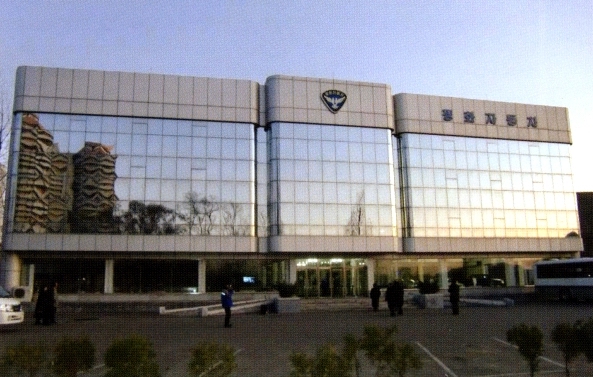
Pyeonghwa
Motors head office in Nampo, North Korea; the company also has
offices in Seoul
Question: Have you encountered challenges working with the North Korean system?
The law in North Korea allows joint ventures. Those laws are properly established. They have studied the laws of other countries and they have made a clear legal system. If I have any problem, I say to them, let's look at the law. I would then show them the law and say, "Let's do it according to your law." And they would agree. The law is important in any country.
People think North Korea is a lawless country, but it is not. If we do business according to the law, no problems arise. The bigger problem is not legal but political; if people go there, they may face political issues. So someone who is concerned about that will not go to North Korea in the first place. They will go somewhere else. There are a lot of other countries to do business in.
But because there is a high risk, there is also a possibility of greater success. So I say, "I'm willing to take that risk." People who are afraid of that don't want to take the risk, so they should go to other countries. The reason the Gaeseong Industrial Complex is succeeding is because it is beneficial both for the North and the South. That is why it is left alone. With the tourism, through Geumgangsan, it was simply South Koreans going there and paying money to North Korea, which helps only them. Gaeseong Industrial Complex, on the other hand, benefits North Korean people through giving them salaries that they wouldn't ordinarily be able to make; and Gaeseong benefits South Korean companies because of the cheap cost of labor. So the North Koreans make a good profit and the South makes a good profit. So I think Gaeseong will continue to succeed. A lot of other areas in North Korea could create ventures similar to Gaeseong and also succeed.
The Nampo area, where Pyeonghwa Motors is located, is a good place for the auto parts manufacturing business to grow. South Koreans can make car parts cheaply there. Labor is cheap there. Labor costs are the biggest cost factor in manufacturing. So if we made an auto parts factory in Nampo, all the factories would have to gather there in the Nampo area, because labor costs are low. American companies, Chinese companies, Japanese companies could go there as well. I have the idea to create a complex like Gaeseong Industrial Complex in Nampo in the future.
Question: Many foreign correspondents expressed disbelief when they heard that North Korea has only a 30 percent stake in Pyeonghwa Motors.
From a business standpoint, with Pyeonghwa Motors, I insisted on a 70-30 ratio from the very beginning. I said if you won't accept that, I won't do this. If we did even a 51-49 split, people would not trust us because North Korea doesn't have that money to invest. The reason I said 70 to 30 is because we would make the investment and they wouldn't have to put up much money. It was difficult at first, but now that works very well. We actually receive that 70 percent of the profit. Other countries investing in North Korea could not get that; they do 51-49 percent, but because that was the first such venture, and I insisted on it, we have sustained that ratio until now. Other companies cannot do that now, because they are coming later than we, and North Korea won't allow it. It was a special case for us. Thus, people have their doubts, but they also find it amazing that such a company can exist. We have the documentation that shows that what I am saying is true.
Question: You are in North Korea for much of the time. Are you well-positioned to contribute to reconciliation between the North Korea and South Korea?
Yes, of course. I cannot tell you everything, but I am making great efforts. In the future people will find out more about what I have been doing. More important than the company is peace. The peace of our people and peaceful reunification are most important. That is what Father is talking about. It's more important than money. I am always thinking about how to bring peace to our people -- what kind of role I can play, how to bring equality, how to "clasp hands" in such a way that both sides are equal. That is the goal.
In North Korea, they also have the metaphor "clasping hands" so I have made this into a campaign. In order to bring unity, we have to bring our hearts and minds together. To do that we have to be equal, act from an equal standpoint. We cannot have unity without unity of minds. We need to win the hearts and minds of the North Korean people. So the North Korean people like this campaign of "clasped hands" very much. I made up a song and a logo for the campaign. I have prepared a domain name. I have spoken about this on various occasions and people are always moved by the ideas. If the North Koreans didn't want this, we could not do it, but they like it as well. It's based on the idea of true love. If one side tries to swallow the other, that's not true love. True love wants to live together, coexist. Equality is not where one is higher and the other is lower. We are the same. We have a common origin. We have the same lineage, the same blood, the same culture.
Right now the South has a little more money, and they are very proud of that. The South says, "We are rich, and you are poor," but that kind of attitude is not going to bring unification. We need to have the same identity and same way of thinking, and then we can unite. Only love can do this.
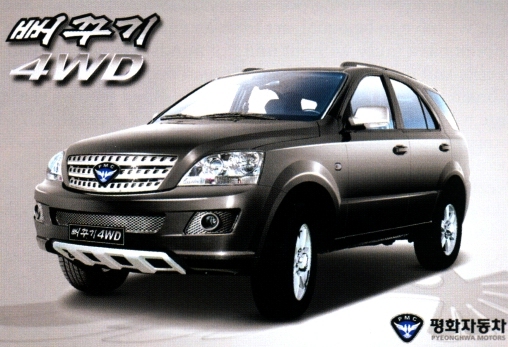
The
Pyeonghwa Motors Beoggugi (Cuckoo) model. The company also makes a
mid-size saloon and a passenger van.
Question: How can you influence South Koreans to think in that way when many South Koreans nowadays don't really want unification?
For this reason, we need to repeat this idea many times, we need to promote this. Right now we're concerned about the nuclear issue, for example, but that concern won't bring about unification. There is nothing we can accomplish by bringing nuclear weapons here. In my view the one who loves more, who trusts more, forgives more -- is the one on the side that will be the center of unification. It seems the South must take the initiative in this. We have more people, ergo more educational institutions. We have a lot of churches, a lot of temples.
We have more people here in South Korea who pray. They pray for peace and freedom and happiness. I think unification will happen centered on the one who prays the most.
There are also a lot of wealthy people in the South. We in the South have not experienced hunger so much, but North Koreans often go hungry. They've shed more tears, they've shivered more often in the cold, they've suffered more, and they've faced more difficulties. The reason South Koreans live well now is not only for South Korea, it is for the North as well, to share with North Korea, to share with its neighbor.
What is the difference between reconciliation and forgiveness? Reconciliation is when two people meet. If my wife and I have a problem, we have to sit together. But I can forgive a person without that person being present. By ourselves we can forgive, but reconciliation requires two people. Forgiveness does not have to be seen.
We here are more blessed than they are, so we need to be the first to forgive. We must be the first to offer the hand of help, to love them more. If we South Koreans forgive the North Koreans more than they forgive us, unification will happen centering on the South. If North Korea loves us more than we love them, and if they forgive us more than we forgive them, unification must come centering on the North.
Which religion will be at the center of unification? The church that has the most love, the church that loves North Korea the most, that sacrifices itself the most, that forgives North Korea the most, unconditionally -- that church will lead the reunification. I hope that our church can become that one, because our name is "Unification Church."
Many people ask how I work in North Korea. Many companies lost ground, making many mistakes. They asked me, "How is it that you are still there? You can even make money there! How do you do that?"
It's very simple: I really love them. I deal with them honestly. In the beginning you may lie, but a month later, a year later or eighteen years later, it will be discovered. And they will think badly of you. But for eighteen years I've been there and I've never told them untruths. Therefore, they say, "Oh, people sent by Rev. Moon don't lie." This is their concept of us. I talk about forgiveness no I talk about clasping hands, and I don't tell them lies.
There are various things we can for unification but more than anything we have to win the North Koreans' trust. We need to help them to trust us. That is the role I am trying to play. If I go there and do my sincere best, they will say they can trust people from the Unification Church. It's not just me; we also have Japanese people there. They like our Japanese church members.
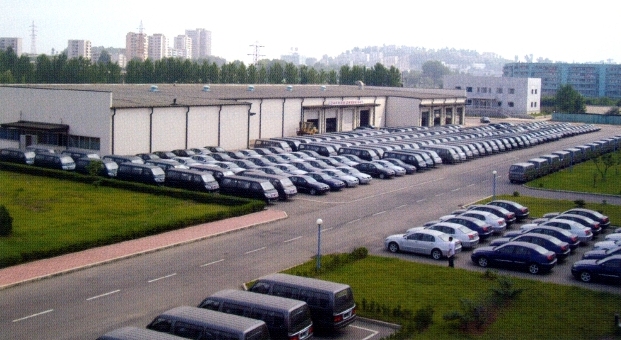
The
Pyeonghwa Motors Corporation plant in Nampo, North Korea
Question: Father also put you in charge of Korean soccer-related issues. Can you say something about what that entails?
The reason we need soccer is to bring our church closer to the ordinary people, a means to communicate with them. We may be a religious organization that people don't like very much, but many people like soccer. People may dislike religion, but they can still like football. Even if someone doesn't like North Korea, he can still enjoy a soccer game in which North Korea is playing. People who like soccer are like that.
So if someone doesn't have good thoughts about our church, yet our team wins consistently, they may think more positively about us and even come to watch us play. It's a way to reach those who are against us.
With this in mind, Father founded a soccer team [in Korea]. While Father is still with us, we want to make things go well with soccer and show good results. The Il Hwa team has won the league seven times in its history.
But there are a number of problems. First, there are now sixteen teams in the league, up from ten. That means about forty league games a season compared with thirty previously. And our team has to take part in the AFC Champions League competition and other extra games. That means sixty games next year. This requires more money and more players.
But, unlike in Europe, soccer in Korea is not a money-making venture these days. Today, it is ten times more difficult to win the championship than before. You need to invest a lot of money, because you have to buy good players. The economics of the matter are at its heart.
As True Parents take a special interest in the team and True Mother's goluii (70th birthday) is next year, we would like to improve our results and bring True Parents great joy. That is our mission. And then 2013 is even more important than 2012!
Will need to show the world something next year and the year after, although it will be a difficult two years. We are preparing new strategies, scouting new players, re-contracting our coach. Team president Kyu-nam Park is working very hard. Please watch us and see how we do.
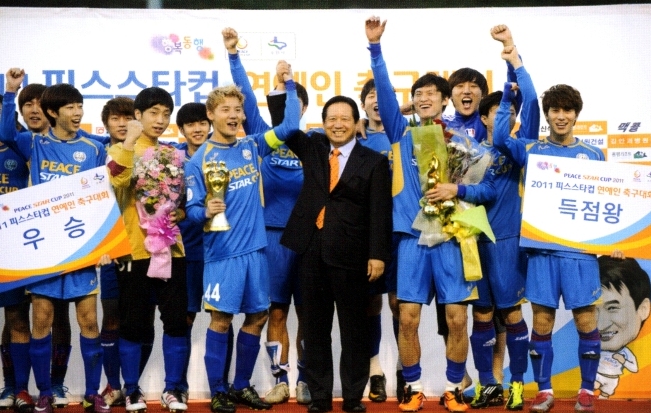
Mr.
Park, who is also responsible for many aspects of the soccer
providence, at the Peace Star Cup, a charity tournament, in which
some of Korea's most recognizable performers compete to benefit the
needy.
Question: You have also been involved with soccer in North Korea.
In Brazil, we have the Sorocaba and CENE teams. Sorocaba has been to Pyongyang three times to play. We are helping the North Korean team qualify for the Olympics and the World Cup. They have not yet qualified for the World Cup in Brazil. We have been providing some behind-the-scenes support for North Korea to develop their soccer abilities, in Brazil.
People are interested in seeing games between North Korea and South Korea, but more than that, we have to get good teams. People who want to watch soccer don't want to watch political games; they want to watch games with a high level of skill. They want to see good teams play. So now it is not such an attraction to just have a game between the North and South; we now have to host games that show the highest standard of soccer. It is expensive, but we need to get the best soccer teams in the world to come to Korea, and then show those teams to the world. We also need to make a profit from these matches. We're studying how to do that.
The most important thing for all sports is sponsorship. If we cannot get a broadcasting company, we cannot get a sponsor. The sponsor will only come if the broadcast company broadcasts it, so there is an advertising effect. You have to have a famous team in order to have it broadcast. So if we cannot get famous teams, we cannot get sponsorship money.
Question: The Peace Cup will be held this year, I understand.
This coming summer the Peace Cup will be held in South Korea. Three teams will come from overseas. With our team, Il Hwa, that will be four. We have not yet decided on the participating teams, but we want to invite teams that have Korean players -- teams that are well-known in Korea. We have already contracted for the broadcasting rights. We have already made an agreement with the city of Suwon to hold the tournament there. We are investing ourselves in the preparations.
Question: Could you hold the Peace Cup in North Korea?
We could do a Peace Cup in North Korea, but under the following conditions: First, many people would have to go there. Of course the North Koreans would watch the games, but only if many people come from South Korea and other nations would it be feasible. We cannot have a game for which the only spectators are North Koreans.
We must overcome political issues, therefore. It would be good if we could take our cameras there, for example, but North Korea won't allow that right now. If the time comes when we can overcome these various constraints, we would certainly think of holding a Peace Cup tournament there.